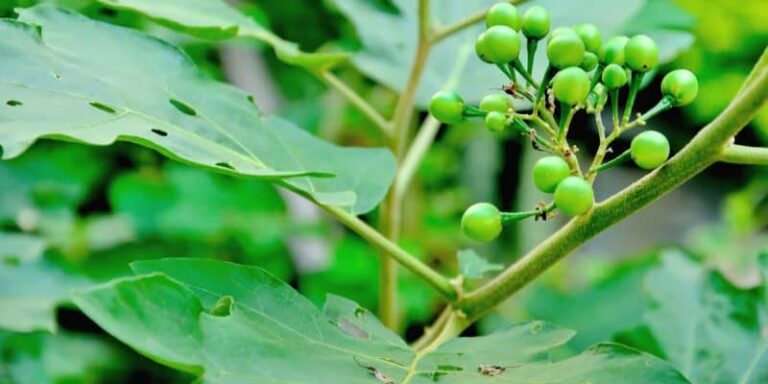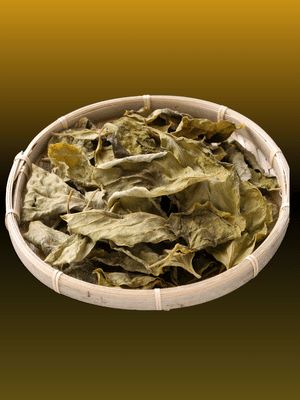7 Benefits of Jamaican Susumba (Turkey Berry) Plant
In Jamaica, Susumba is also known as Gully bean. The plant grows wild but it is filled with many nutrients and health benefits.
So, what is Susumba? The Susumba plant is Scientifically known as Solanum torvum. It belongs to the nightshade family of plants and is related to eggplants, and tomatoes.

Some other names for Susumba include Turkey berry, Susumber, and Wonder berry. In several locations the plant is called Devil’s fig, Pea eggplant, Sundakkai plant, or Plate bush.
Disclosure: This article may contain affiliate links. It means if you make a purchase after clicking a link here I may recieve a small commission at no charge to you. Thank you!
Susumba Leaf Benefits
Susumba leaves, like the fruit of the plant have been widely studied. When researchers examined several active compounds in susumber plant, here are some potential health benefits they found in susumba leaves:
- Antioxidants: All sections of the Turkey berry plant contain various antioxidants like flavonoids and phenolic compounds. These help protect cells from damage caused by free radicals.
- Treat Anemia: Because Susunba leaves are rich in Iron consuming them may help treat iron dificiency. And turkey berries leaves easily available so in some countries pregnant women eat them to supplement their iron intake.
- Control High Blood Pressure: Early research suggests that Susumber has natural compounds that may be help lower blood pressure. Gallic and ferulic acids are the two compounds in Susumba leaves that can help blood pressure control.
- Aid Disgestion: Susumba is a good source of dietary fiber. And fiber aids in digestion, helps regulate bowel movements, and supports overall gut health.
- Prevent Gastric Ulcers: A 2018 study of Solanum torvum leaves identified anti-ulcer properties in susumba leaves. The compound reduced secretion of gastric acid which also reduces the risks of formation of gastric ulcers.
- Help Liver Damage: One Phenolic compound extracted from Susumba leaf was tested on mice with liver damage. The results confirm that the Susumba leaf extracts may potentially be used as an agent for protecting and treating liver damage caused by some medications.
- Preserve Your Eyesight: Vitamin A is one of the important micronutrients found in the Turkey berry. Vitamin A is essential for good eyesight and because Turkey berries are rich in Vitamin A, they may be useful for preserving vision.
- Repair Kidney Damage: An animal study was done to see whether Subumba leaf extract can repair Kidney damage caused by some medications. Early reports indicate that Susumba extracts may infact repair kidney damage caused by some medication.
Turkey Berry Tea
Turkey berry (Susumba) leaves are often used to make an herbal tea that users claim have several health benefits. Some traditional uses for Susumba leaf tea include treating hypertension, diabetes, stomach irritations, coughs, and respiratory ailments.
How do you prepare Suusmba leaf tea? To make Susumba leaf tea, you will need some dried Susumba leaves and water.
- Bring 4 cups of water to a boil in a pot.
- Add 2 tablespoons of crushed, dried Susumba leaves.
- Let the leaves boil for 3-5 minutes.
- Remove the pot from the heat and allow the tea to brew for 2-3 minutes more.
- Strain it into a cup, Sweeten with your favorite sweetener and enjoy.
You find Susumba leaves at you local health food stores or online.
Susumba Uses
People across the globe, including Jamaica and other Caribbean islands, use both the turkey berries and the leaves of the plant for its culinary and medicinal benefits.
Susumba: How is Susumba used In Jamaica. One popular way to consume Jamaican Susumba is to cook the berries as a stew.
Young Susumba berries are cooked and combined with salted mackerel or some other form of cured protein. Coconut milk, onions and tomatoes are added to the mixture. It is then served of white rice or with dumplings.
Here is how Turkey berries and other sections of the plant are used in other areas:
| The Wider Caribbean | In other Caribbean islands it is also used in stews, soups, chutneys, and teas. |
| Sierra Leone | Susumba leaf tea is given to children for sore throats and stomach aches. |
| India | In some areas in India, dried Turkey berries and leaves are ground into a powder which is used to make a paste that is consumed in Indian cuisine. The powder is consumed as diabetes medicine as well. |
| The Philippines | The Susumba plant root is dried and used to make a syrup for treating stomach aches, indigestion and gas. |
| Senegal | Tea made from ripe Turkey berres is given to children as a cough suppressant. |
Turkey Berry Side Effects
Solanum torvum has some compounds which can cause problems if you eat too much of it.
Some users report nausea and confusion, dizziness, stomach ache and diarrhea after using Susumba.
Solanum torvum belongs to the Nightshade family of plants. People who are allergic to Nighshade may not tolerate this plant.
Safety Precaution
Is Susumba Poisonous? A poisonous variety of Susumba has been identified in Jamaica. The plant appears almost identical to the non-toxic Turkey berry.
There have been reports of people experiencing serious effects after consuming this variety of Jamaican Susumba.
Investigation show that the poisonous variety contains larger amounts of Solamargine, and other steroidal glycoalkaloids than the non-toxic variety.
Reports of say some persons who consumed this variety of “Jamaican Susumba” have had severe reactions including dizziness, slurred speech and upper body weakness.
Conclusion
Susumba is the Jamaican name for the plant known as Turkey berry in many other locations.
Susumba berries are used in Jamaican cooking, while Susumba leaves are used to make an herbal tea that is used as home remedy for treating, coughs, colds, upper respiratory issues, indigestion and other common issues.
The turkey berry plant has been subject of several studies. But the human studies are limited. So while preliminary investigations are promising, a lot more research needs to be done.
Important Note: But some studies found that the body may not easily absorb the Iron in Susumba. Therefore, it may be necessary to take the berries with some foods that contain Vitamin C to help the body absorb the Iron inTurkey berries.
Disclaimer: This website is for informational purposes only. Nothing stated here should be viewed as medical advice. Please consult with a Professional Healthcare Provider about your medical care.

